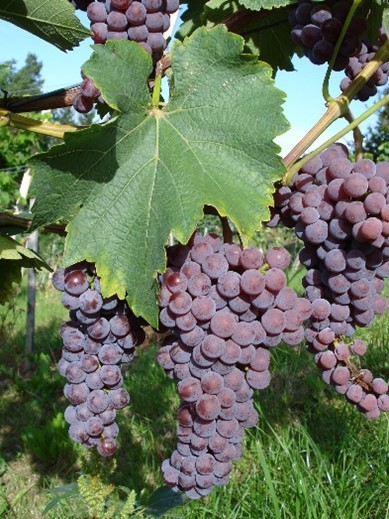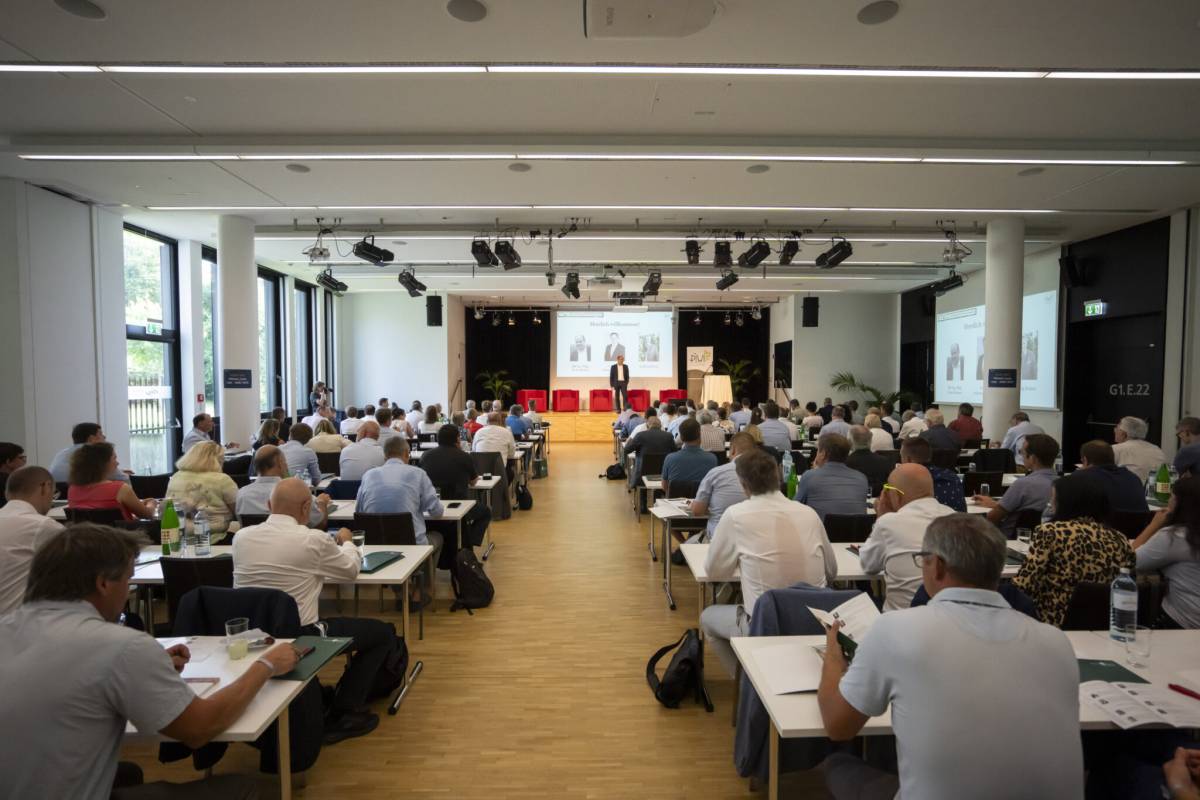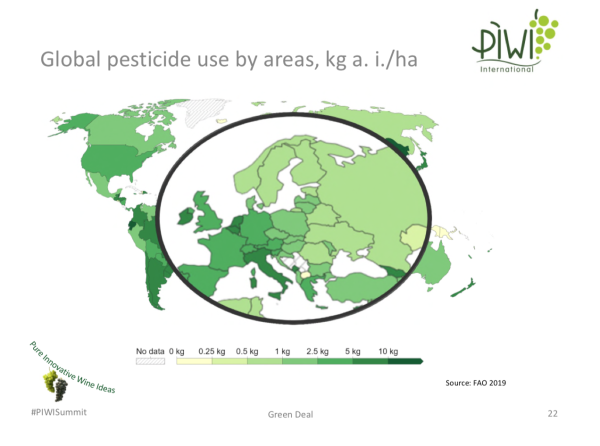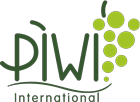PIWI Austria
Chairman PIWI Austria

Ing. Oen. Wolfgang Renner
Department 10
Test station for fruit and winegrowing HAIDEGG
Ragnitzstrasse 193
8047 Graz
Tel .: +43 (0) 316/877 - 6614
wolfgang.renner@stmk.gv.at
www.haidegg.at
Deputy Chairwoman Anna Paradeiser – Fels am Wagram
Treasurer Christian Waltl – Klagenfurt
Deputy Treasurer Karls Saturday – Guntramsdorf
Secretary Lea-Maria Linhart
Deputy Secretary Daniel Pachinger – Eisenstadt
Extended Board of Directors Werner Resch – Kirchberg/R.
Extended board member Johannes Friedberger
Latest News
PIWI Wine Award Austria 2024 – New / innovative grape varieties
Souvignier gris: fruity or Burgundian?
VARIETY CHARACTERISTICS AND ADJUSTMENTS IN THE CELLAR
Author Wolfgang Renner

According to multiple applications in 2023, there are 66 hectares of the Souvignier gris grape variety in Austria. This proves to be a versatile representative of the group
of fungus-resistant grape varieties (PIWI). Current grafting figures suggest a further increase in area. Several years of experience in
Cultivation and expansion from Styria shows the characteristics of this variety.
The Piwi grape variety Souvignier gris (pronounced Suvinje grie) was bred in 1983 by Norbert Becker (1937 – 2012) at the State Viticulture Institute in Freiburg im Breisgau (D). Originally, the parentage Cabernet Sauvignon x Bronner was assumed. However, a genome analysis disproved this assumption. Souvignier gris is actually a cross between Seyval Blanc x Zähringer.
Conclusion:
In any case, Souvignier gris is an interesting newcomer. The German breed from the Freiburg im Breisgau Wine Institute is enjoying increasing popularity in most Austrian wine-growing regions. Depending on the ripeness of the berries and the way the grapes and must are processed, this grape variety can produce many different variants - from simple quality wine to excellent quality sparkling wine.
Previous experiences also show that Souvignier gris is able to represent the terroir of an area or a location well.
Competition: New / innovative grape varieties
Largest PIWI competition in the German-speaking region!
Graz, July 2023
In the fifth year, the Austrian PIWI wine competition "New / innovative grape varieties" again brought an increase in the number of participating companies and registered wines. The top-class international jury was able to evaluate PIWI wines from all the important wine-growing federal states.
Interest in PIWIs is also increasing in Austria
Contribution and source Olivier Geissbühler DELINAT
On June 22, 2023 took place in Krems, Austria German-language PIWI symposium It was organized and carried out by the cooperative "Winzer Krems" and "PIWI Austria" in cooperation with PIWI International. International scientists, vine growers and winemakers spoke about their experiences and the importance of new varieties for the future of viticulture. Here are a few insights that I (re)discovered on this day.
Straight to the video
https://youtu.be/5nCBWSC6wWI

Austrian PIWI Wine Competition "New / Innovative Varieties 2023"
We cordially invite you to the 5th PIWI Austria Wine Competition!
The jury tasting will take place on July 20, 2023 at the Haidegg research station in Graz.
Registration deadline: July 17, 2023
In the invitation you will find the conditions of participation, the participation fees and the registration form.
Cooperation with wein.plus: Benefit as a member of PIWI-International!
There is a cooperation between PIWI International and wein.plus that aims to promote the association and its members on wein.plus. In this webinar, which lasts no more than 10 minutes, Utz Graafmann will show how you as a winery can benefit from this.
Tuesday, February 14, 2023 at 6 p.m. (the webinar will be recorded)
Sell wine successfully with wein.plus for wineries
Find out how you, as a winery, can maximize your wine sales, find stockists across Europe and get support in the sales process. Learn methods to increase the visibility of your winery on wein.plus and increase your sales figures. Use wein.plus to bring additional visitors to your winery or to advertise events.
Language: German
Duration: 20 minutes
First Worldwide Online PIWI SUMMIT
 The Green Deal, the CRISPR-Cas technique and the resistance gene in the spotlight: Are we excited or not?
The Green Deal, the CRISPR-Cas technique and the resistance gene in the spotlight: Are we excited or not?
As PIWI representative in Spain, I was delighted to attend this first summit.
I took part with the aim of training myself, because resistant varieties are a new world that is opening up to us and I am convinced that it will represent the viticulture of the future.
I am happy to see this development:
- how the idea of crossing Vitis species with each other to make vines more resistant came about,
- in which countries these new varieties spread the most
- knowing that each new PIWI grape variety requires more than thirty years of research.
Climate change and the Green Deal are so topical and omnipresent that we now have to rethink and take the bull by the horns.
Although Spain's wine legislation does not yet provide for the cultivation of resistant varieties for commercial purposes, it is clear that this must change immediately.
PIWI International is represented and active throughout Europe and the response to these “NEW WINES” is spectacular, especially for their quality and sustainability; a must with regard to environmental protection and health.
With regard to the Green Deal, I was captivated by the lecture by Dr. Wolfgang Häussler, PIWI winemaker and EU advisor.
The F2F strategy (Farm to Fork) and the strategy to promote biodiversity for sustainable food production envisage a reduction in the use of pesticides by 50 % by 2030.
In order to achieve these goals, the following measures are required in the wine sector, among others:
- provide for the use of products and techniques to minimize toxicological and ecological risks,
- to keep the soil organically active and to promote biodiversity
- start the transition from growing traditional grape varieties to growing resistant varieties.
Opinions are divided on one topic: the CRISPR-CAS9 technique, which the EU considers suitable for speeding up the breeding of resistant varieties.
Some organic winegrowers do not find this “natural”, while the proponents consider it acceptable because no genetic modification per se takes place, but only the improvement of the resistant properties is worked out, which otherwise takes years of breeding.
I will not go into any more detail as all the presentations explaining these issues can be found in the members area of the PIWI International website.
The role of PIWI International in terms of communication and lobbying was explained in further presentations: With almost 1000 members in 30 countries, PIWI International is one of the largest international winegrowers' associations.
In order to strengthen the lobbying character of the association and to facilitate the exchange of knowledge between winegrowers, researchers and politicians in the wine sector, a comprehensive internal and external communication strategy has already been initiated.
Another incredible talk was given by Vitalie Popa, the Moldovan inventor of barrels that allow the winemaking and aging process to be completely free of preservatives and additives.
And last but not least, the lecture by Remo Räz from the biodynamic winery LENZ in Switzerland, who reported on their experiences with 12 PIWI red wine varieties and went into vinification and marketing of these PIWIs.
This case clearly showed us that PIWI brings about a drastic reduction in pesticide treatments, eliminates the need for copper and greatly reduces fuel consumption compared to traditional varieties.
The world is changing and it is time to act and bring nature back into our lives.
Together we can do anything.
We therefore invite you to actively participate in our community by sharing information and contributing your knowledge or experience.
Click here for the podcast with Wolfgang Häußler and Diego Weber (German)
Become a member: https://piwi-international.org/der-verein/mitglied-werden/
Karin Lundberg – PIWI Spain in January 2023
PS: Oh yes, I almost forgot to mention that the PIWI SUMMIT will take place quarterly. So make a note of the next date in your agenda: April 17, 2023 at 6:00 p.m.
Making an amber wine from piwis
There’s a hammock chair on the balcony at BioWeingut Karl Renner with staggeringly beautiful views of Steiermark (Styria), rightly described as the “green heart of Austria”. The balcony, above the winery and near the kitchen of the family home, looks like a wonderful place to relax. Karl Renner, who took over the family wine business in 1997, comes here to think but he finds it difficult to relax. All he sees is the work that needs doing in the family’s organically-farmed vineyards.
BioWeingut Karl Renner has 6.5ha of vines, including about 0.9ha of rented vineyards and 1.8ha of new-generation piwi grape varieties. The piwis cause much less stress than his other white varieties (Sauvignon Blanc, Pinot Blanc, Morillon (Chardonnay), Muskateller, and Welschriesling).
In this “challenging vintage” – where there was much more disease pressure – he only sprayed the piwi vines once, with copper and sulphur, at the end of June, beginning of July to prevent the fungus attacking older leaves. For one application on the piwis he used 1kg of Bordeaux mixture per hectare whereas for the conventional varieties he used 4kg.
Karl knows it’s been a tough year for the vines as he’s spotted some fungal diseases on two of the mildew-resistant piwis, Souvignier Gris and Chardonel. “This says the pressure was very high,” Karl states. For the first time, he may have lost 10% of these grapes to rot but he describes their performance in general as “super, wonderful”.
Experiences with PIWIs in Austria and Styria - Wolfgang Renner
agenda
•Overview of Austria
•Variety testing in Haidegg
•Experiences 2022
•Experience in wine development
•PIWI Austria
PIWI is developing into a quality mark - PIWI Wine Challenge 2022
High level at the PIWI International Wine Challenge 2022

Gone are the days when PIWI vines were grown primarily for environmental reasons. There are now many very good wines made from PIWI varieties, as well as numerous internationally committed winegrowers who can draw on a lot of experience with PIWIs both in viticulture and in winemaking and who bottle the best wines, which the PIWI International Wine Challenge 2022 has fully confirmed . Two thirds of the wines received SILVER or GOLD, even TOP GOLD. The high quality was generally confirmed by the visitors at the subsequent public tasting, for which all the wines were presented according to the blind evaluation. The PIWI mark, which PIWI members are allowed to put on the labels of their wines, can be considered something of a quality mark. And so PIWI wines bring environmental protection and enjoying good wines together and can be considered an important future of wine.

